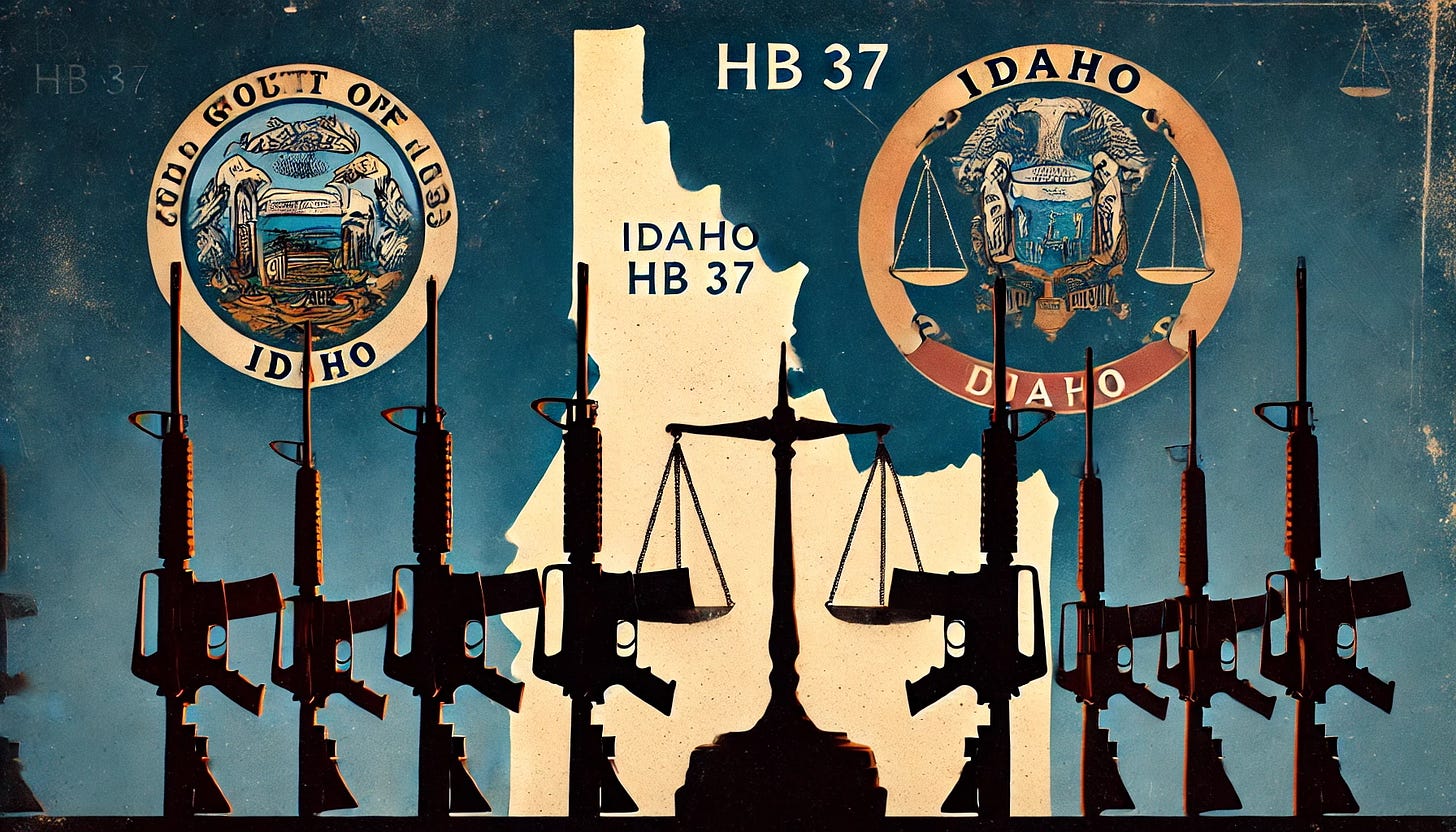🔥 Idaho House Bill 37
The Return of the Firing Squad & What It Means for Justice ⚖️
Introduction: Setting the Stage
“In a move that has shocked the nation, Idaho is bringing back the firing squad as its primary method of execution.”
This decision has sparked intense debate—not just in Idaho but across the country. House Bill 37 represents more than just a change in execution methods; it forces us to grapple with deeper questions about justice, ethics, and the future of capital punishment.
Why did Idaho make this move? What legal and constitutional challenges does the bill face? And what does this say about our society’s values? In this Substack post, we’ll expand on the themes explored in our recent YouTube Deep Dive podcast—a must-watch for anyone looking to understand the full scope of this issue. 🎥 (Watch the full podcast here)
Chapter 1: Why Idaho? The Road Back to the Firing Squad
Idaho has a history with firing squads, dating back to when it was still a territory. Like much of the U.S., the state moved to lethal injection in the 20th century, viewing it as a more humane alternative. So why revert now?
💉 The Issue with Lethal Injection: States have struggled to secure the necessary drugs, and high-profile botched executions have raised serious ethical and legal concerns.
🎯 The "Reliability" Argument: Supporters of HB 37 argue that firing squads are quick, effective, and more humane than lethal injection failures.
Idaho now finds itself at the forefront of a larger national conversation about execution methods and whether they meet modern constitutional and ethical standards.
Chapter 2: The Legal Battlefield – Does HB 37 Hold Up?
🔎 Eighth Amendment Concerns: The U.S. Constitution prohibits cruel and unusual punishment. Critics argue that firing squads are inherently brutal and outdated, while supporters claim they are more humane than botched lethal injections.
⚖️ Key Legal Cases: Bayes v. Reese (2008) established that execution methods must not pose a "substantial or objectively intolerable risk of harm." The courts will have to decide whether firing squads meet this standard.
🚨 Due Process & Vagueness: The bill gives Idaho’s Department of Correction Director the power to declare when a firing squad is "available"—but without defining what that means. Critics warn this could lead to arbitrary decision-making.
🏛️ Separation of Powers: Does HB 37 shift too much authority to one executive official, undermining judicial oversight? Many legal scholars say yes.
This bill is a prime candidate for legal challenges, and Idaho is about to enter uncharted territory in the courts.
Chapter 3: The Ethics of Execution – A Question of Humanity?
Capital punishment has always been a deeply emotional and ethical issue. HB 37 raises serious questions about what it means to carry out justice in a humane way.
🩸 Two Sides of the Debate:
Supporters argue that the firing squad is quick, effective, and honest, without the pretense of being "painless."
Opponents see it as a barbaric step backward, invoking imagery of the Old West rather than modern justice.
👥 The Human Cost:
Prison staff who must carry out these executions may face long-term psychological trauma.
Families of victims and the condemned may experience complicated emotions—some seeking closure, others feeling disturbed.
Society at large must ask: Does this reflect our values as a nation?
The ethical debate surrounding HB 37 goes beyond the law—it forces us to examine our collective moral compass.
Chapter 4: Public Opinion – What Idahoans Are Saying
Idahoans are divided on HB 37. While we don’t have official polling yet, letters from citizens reveal a wide range of opinions:
🗣️ Arguments Against:
"This bill makes Idaho look like a relic of the past, not a forward-thinking state."
"Executions are already controversial—bringing back firing squads just makes things worse."
"The risk of botched executions remains—what if a shooter misses?"
✔️ Arguments in Favor:
"Lethal injection is unreliable and deceptive—the firing squad is more transparent."
"If we’re going to have the death penalty, let’s stop pretending it’s painless."
"This method is cheaper and faster than drawn-out lethal injection delays."
Regardless of personal stance, the public debate is intensifying, and Idaho’s decision is sparking national and international discussion.
Chapter 5: What Happens Next?
🔍 Legal Battles Ahead: Lawsuits are inevitable. If HB 37 faces a constitutional challenge, it could reach the Supreme Court.
💰 Financial & Logistical Challenges: Implementing firing squads isn’t as simple as pulling a trigger—it requires facilities, trained personnel, and legal safeguards. Who pays for it?
🌎 A National Precedent? Idaho could set the stage for other states considering alternative execution methods as lethal injection becomes harder to administer.
HB 37 has created far more questions than answers, and its implications will be felt far beyond Idaho’s borders.
Conclusion: A Message to Idaho
Idaho has placed itself at the center of a national debate on capital punishment. Regardless of whether this bill survives legal challenges, it forces us all to confront critical questions:
🤔 What does justice look like in 2025?
📜 Are we moving forward or backward?
⚖️ Does the death penalty truly serve its intended purpose?
Idaho’s decision to revive the firing squad will shape conversations on ethics, law, and policy for years to come. The nation is watching. What happens next will be one of the most defining legal battles of our time.
Join the Conversation! 💬
🎥 Watch our full YouTube Deep Dive Podcast on HB 37 (Watch Here)
📢 What do YOU think? Should Idaho move forward with this law, or should it be challenged in court? Drop your thoughts in the comments!
🔔 Subscribe for more deep dives into today’s biggest legal and ethical debates! 🚀
📚 Bonus Resources:
📜 Full text of Idaho House Bill 37
⚖️ AI Powered research
Thank you for reading! Let’s keep the conversation going. 🔥⚖️



I’m surprised there’s no mention of the Mormon angle. I suspect the real motive underpinning this is religious, like the firing squad option in Utah.
https://en.m.wikipedia.org/wiki/Blood_atonement